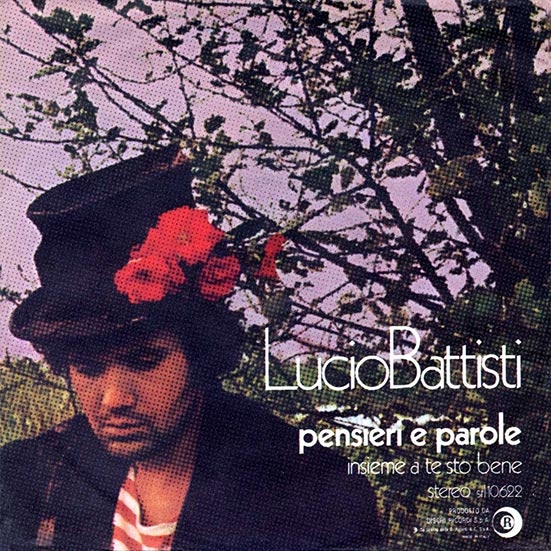Pensieri e parole

Pensieri e parole talks about a communication problem with a loved one. It is composed of many images that we can represent individually, trying to reduce the narrative unity to favour instead a perhaps more meaningful stylistic fragmentation.
“Che ne sai di un bambino che rubava/e soltanto nel buio giocava” (What do you know about a child who stole/and played alone in the dark) refers to my childhood, that of a boy born in the outskirts, who stole fruit in the orchards and was beginning his first timid courtships of girls of his age.
“E di un mondo tutto chiuso in una via” (and of a world all enclosed in a street), this street represented the world of my childhood, the last street in the city before the countryside, completely surrounded by fields, where we played.
“E di un cinema di periferia” (and a suburban cinema), which was that of Via Pacini, where we went on Sundays, waiting anxiously for the opening with a few coins in our pockets.
“Che ne sai della nostra ferrovia” (what do you know about our railway)? It was the border of our territory, because beyond Via Clericetti there was another street and immediately beyond was the embankment of the railway line.
“Conosci me la mia lealtà/tu sai che oggi morirei per onestà” (you know me, my loyalty / you know that today I would die for honesty). This is the sincere confession of a profound reality, which leaves no doubt about my existential attitude.
Che ne sai tu di un campo di grano/poesia di un amore profano (what do you know about a wheat field / the poetry of a profane love) We used to play in the countryside, in a wheat field that stood tall around us and was used for our adolescent games, but it was so pristine that I felt as if I were profaning it.
L’amore mio/è roccia ormai/e sfida il tempo e sfida il vento e tu lo sai (My love / it is a rock now / and challenges time and challenges the wind and you know it) On one hand there is the man I have become, beyond my lack of self-confidence and malice, on the other there is the memory of the one I was not long before.
“Che ne sai di un ragazzo per bene/che mostrava tutte quante le sue pene” (what do you know about a good boy / who showed all his pains?), these are ironic words. I speak of a recent past, not far removed, in which the development of personality was not yet well defined.
Davanti a me c’è un’altra vita/la nostra è gia finita/e nuove notti e nuovi giorni/cara vai o torni con me (before me there is another life / ours is already over / and new nights and new days / darling go or come back to me) It is a moment of great indecision, because two opposite states of mind seem to coexist, on the one side, the feeling that the relationship is over, on the other, the desire to leave a glimmer of hope that it can be saved.
Davanti a te ci sono io/dammi forza, mio Dio/un altro uomo (It’s me right in front of you / give me strength, my God / another man) The problem is to overcome the moment of separation. To do this he asks God for help and, at the same time, he asks the woman to forgive him for having pushed her into the arms of another man.
E nuove notti e nuovi giorni/cara non odiarmi se puoi (and new nights and new days / darling, do not hate me if you can), these are truly sincere words, because even if he is determined to split up, he still feels tenderness remembering that love.
Che ne sai di un viaggio in lnghilterra/che ne sai di un amore israelita (what do you know about a trip to England / what do you know about an Israelite love?), this is a fun memory of a trip I took to England for study. I was staying with a Jewish family as a paying guest. The father was very fond of me, he felt a lot of tenderness towards me to the point of bringing me into their circle, passing me off as a Jew. There I found a girlfriend and many friends. Later, on the occasion of a famous Jewish holiday I did not know, I betrayed my true religious origins by asking a wrong question. From that moment I found myself without friends and without a girlfriend.
This is a very meaningful song in my output and contains so many memorable moments in my life, including the separation from my wife, which was traumatic. It happened in 1971, a period when separations were perceived as extremely upsetting events, especially when children were involved. It brings out my great pain due to the lack of communication between us; there was affection, but we could no longer talk to each other.
I think it is also one of the most evocative texts, from this point of view, from which emerge many elements of my past, almost a broad description of a world lived in contrast to the lifestyles of the moment.
Quoted from: Fontana, Gianmario (a cura di), Mogol. Umanamente uomo, Milano, BMG Ricordi-Sperling & Kupfer, 1999, pp. 75-77
